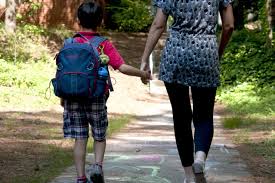Impact of bereavement on children, their development and education
For many, the death of a parent, sibling, friend or relative can be extremely difficult. The feeling of bereavement is extremely intense on the child.
The nature of grieving is individual to the person. When spotting signs, remember that no two children are the same, and that grieving children require patience, time and compassion. It is essential to reassure the child that what they are feeling is normal and a natural reaction to the death of someone they are close to.
Common responses by the child to bereavement include; tiredness, mood swings, anger and frustration, and lack of response.
Tiredness; the child may exhibit this, the grieving process is tiring for anyone involved. The child may be getting sleepless nights. Mood swings; the child will be experiencing extreme lows, and will probably be switching between these and seeming like they are fine, their mood may seem irrational, and they may become angry or sad at the smallest things - remember that this is normal, and try and be patient with the child. Anger and frustration; these two emotions often go hand-in-hand with each other, the child may become frustrated by their situations and lash out at the smallest of things. Lack of response; the child may show a lack of emotion towards the bereavement, they may be doing this to protect themselves from hurting, try and talk to the child and remind them that it is okay to feel sad.
How can you help?
There are many ways you can help a child through bereavement, including:
- Be aware that sometimes behaviours from the child can be noticed by other children, this may result in teasing/ bullying
- Remind the child that grieving is normal, and they need time to do this
- If they are throwing themselves into their studies more than usual, help them take a break and grieve properly
- Help the child understand that they won’t always feel like this, or different to their peers, and if they take the time to grieve then they will feel better
Impact on education
Bereavement can have a profound negative impact on a student’s academic achievement. The child may start to experience problems with their concentration at school. Their grades may drop. They might start to feel different from their peers, and may struggle to fit in.
Studies have found that children’s families who were involved in their school life achieved better academically; they had better attendance, completed more homework, and were more motivated overall. If a child experiences their parent being actively involved in their school life, to not having them there at all, this will have a negative impact on their studies. If the child is due to take exams, and these are close to the loss, you may want to think about special exam consideration for pupils.
As well as having a negative impact on education, if the child hasn’t dealt with the loss properly, as most don’t, this may have short and long-term implications on mental health such as increased anxiety or depression.

Help the child understand that they won’t always feel like this
Impact on development
All children are different. The way one child gets affected by loss may be completely opposite to that of another, age is also an important factor.
At the age of 0-2 children have no concept of death, however they may notice the absence of a parent between 4-7 months. They may become anxious about separating from their parent, and show signs of feeding and sleeping difficulties.
Between the ages of 2-5, children may grow to fear abandonment and separation. Children may feel angry about changes to their daily routine, or have physical complaints such as stomach aches, or wetting the bed.
For 5-11 year olds the challenges associated with bereavement evolve. At the age of 8, children tend to start to understand the finality of death. Common challenges, without the addition of bereavement, in development include getting angry more often, including difficulty concentrating at school. When a bereavement happens, children may try to be the perfect child, or show signs of regressive behaviour. The child may also struggle to express themselves verbally.
No-one should suffer in silence, experiences in childhood are what make us. If you think a child is struggling with bereavement then contact us and we can help.











